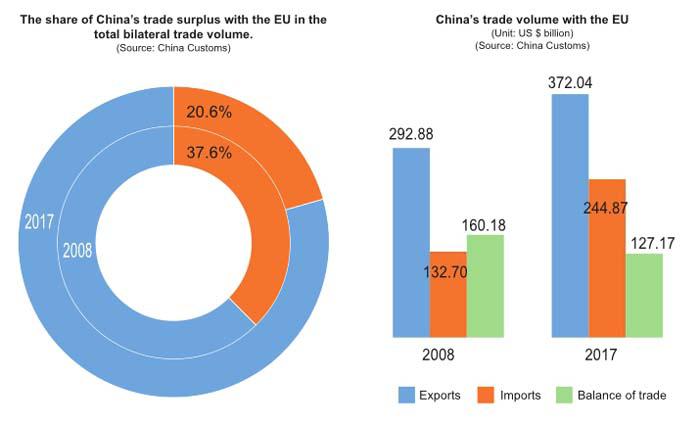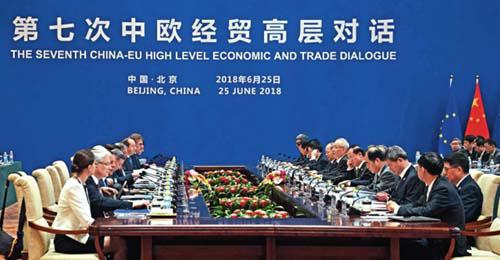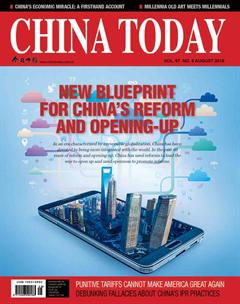China-EU Trade Relations:Gearing up for Growth
By YAO LING
IN March this year, the U.S. claimed that steel imports have threatened its national security, necessitating the need to place tariffs on imports of iron and steel from its major trade partners. Ignoring WTO dispute-settlement procedures, the U.S. unilateral action has severely challenged the rulebased trading system that global trade has relied on. As two of the biggest traders in the world, China and the EU have supported a multilateral trading system and proactively promoted economic globalization, trade and investment liberalization and facilitation. To safeguard their common interests, China and the EU should have a clearer understanding of bilateral economic and trade relations, so to push forward their economic and trade cooperation.
Good Timing for Repositioning
This year marks the 40th anniversary of Chinas reform and opening-up. Over the past four decades, China has been adhering to the fundamental national policy of opening-up and pursuing development with its door wide open. In the process of integrating into the world economy, the country itself has seen substantial changes and made significant contributions to global economic growth. Chinese President Xi Jinping has emphasized that Chinas door will not be closed to the outside world and the country will only open up even wider. Over the past 40 years, the EU has been a participant in Chinas reform and opening-up campaign, and also gained substantial benefits from the drive.
Since 2013, the EU has asked for wider market access to China in terms of both goods and services, as well as government procurement. It has requested China to reduce market access restrictions. All these requirements have been reflected in China-EU bilateral investment treaty (BIT) negotiations with the first round launched in 2014, and EUs adjustment of its strategy on China.
China, based on its practical conditions, has been actively responding to the EUs concerns. In April 2018 when attending the Boao Forum for Asia Annual Conference, Xi Jinping announced a slew of major measures to boost Chinas opening-up, including broadening market access, creating a more attractive investment environment, strengthening intellectual property protection, and taking the initiative to expand imports. These measures have been implemented step by step. So far, the Chinese government has taken a series of concrete actions, such as removing foreign eq-uity caps on banks and financial asset management companies, as well as manufacturing of new-energy vehicles, and cutting import duties on automobiles, auto parts, and some everyday consumer goods. On June 15, the State Council unveiled more foreign-investorfriendly measures to further open up and promote high-quality economic development, with detailed measures and relevant timetables being made.
These actions have shown Chinas commitment to accelerating reform and opening-up, opposing trade protectionism, and supporting economic globalization. They are also of great concern to the EU. After these measures were implemented, European enterprises are expected to have more promising prospects in the Chinese market when they expand their businesses or when they export European signature products such as agricultural produce to China. In the face of rising protectionism, populism, and unilateralism, Chinas efforts in further opening up means both China and the EU will see brand new opportunities for cooperation, and also implies a good timing for the two sides to reposition their economic and trade ties.
Growth amid Competition
Over the past three years, China-EU economic and trade relations have been characterized by win-win cooperation on the whole. Both sides have seen more intensified and balanced trade and investment cooperation. However, some subtle changes have occurred as the EU sees China as a competitor, and has adopted some trade defense measures on China. The overall situation of the bilateral economic and trade relations can be summarized as the following two aspects:
First is that China-EU trade and investment cooperation has seen common development.
In 2017, the bilateral trade between China and the EU reached a record high of US$ 616.9 billion, up by 12.7 percent year on year. Chinas exports to the EU stood at US$ 372.04 billion and its imports from the EU was US$ 244.87 billion, a year-on-year increase of 9.7 percent and 17.7 percent respectively. The share of Chinas trade surplus with the EU in the total bilateral trade volume has shrunken from nearly 40 percent in 2008 to about 20 percent in 2017. The EU has been Chinas largest trade partner for 14 consecutive years, being the largest source for Chinas imports for seven consecutive years, and the second largest market for Chinas exports for six consecutive years.
Bilateral investment has become more balanced in the past decade. Since the European debt crisis began in 2009, the EU member countries have increasingly needed foreign investment. Meanwhile, Chinese enterprises have accelerated their pace in going global; therefore, Chinas foreign direct investment (FDI) to the EU has increased rapidly since 2009. By the end of 2016, Chinas accumulated FDI in the EU hit US $69.83 billion, while the EUs FDI in China totaled US $110.336 billion. The ratio was less than 1:2, which is more balanced considering it was still 1: 19.2 in 2008.
The second aspect is increasing competition exists in the China-EU economic and trade cooperation. This is mainly due to the EUs inadequate understanding about Chinas fast economic development. The EU has highlighted “fair trade” and “opening-up on an equal footing” in launching economic and trade cooperation with China, yet it has adopted some trade defense measures against China, such as setting up a mechanism to screen FDI, allying with the U.S. and Japan to ramp up trade pressure on China in areas of intellectual property rights protection and overcapacity in the steel sector.
New Opportunities
As the largest developed economic body, if the EU can grasp the opportunities brought about by Chinas ongoing reform and opening-up, it will become the biggest beneficiary. In fact, both sides should take advantage of Chinas further opening-up and build closer economic and trade relations. It is time for the EU to adjust some of its measures and practices at the institutional level that jeopardize Chinas interests.
First, both sides should enhance communications and exchanges at all levels and in all areas, including development strategies and foreign economic policies, so as to eliminate misunderstandings and promote mutual trust. Efforts should be made to figure out an effective way to help European companies be more involved in Chinas new round of opening-up, enabling them to reap substantial benefits.
Second, both sides should continue to promote international cooperation under the framework of the Belt and Road Initiative. China considers the EU an important partner for cooperation under the Belt and Road Initiative, which although proposed by China, provides opportunities and benefits for the whole world. Guided by the principle of extensive consultation, joint contribution, and shared benefits, the initiative denies outdated geopolitical maneuvering and aims at building a platform for wider cooperation.
Third, both sides should work hard to improve relevant mechanisms and systems to boost bilateral economic cooperation for a win-win result. Both sides should accelerate BIT negotiations and launch a joint feasibility study for a China-EU free trade area as early as possible, as its establishment will surely bring mutual benefits and win-win results based on the research conducted by the Center for European Policy Studies and research centers affiliated to the Ministry of Commerce of China.
Fourth, both sides should work together to enhance coordination of international economic policies, safeguarding a rule-based multilateral trading system and jointly oppose unilateralism and trade protectionism, so as to improve trade liberalization and facilitation. The development of China and the EU cant be achieved without a free and open multilateral trading system. Confronting the rising wave of unilateralism and trade protectionism, cooperation is needed.

